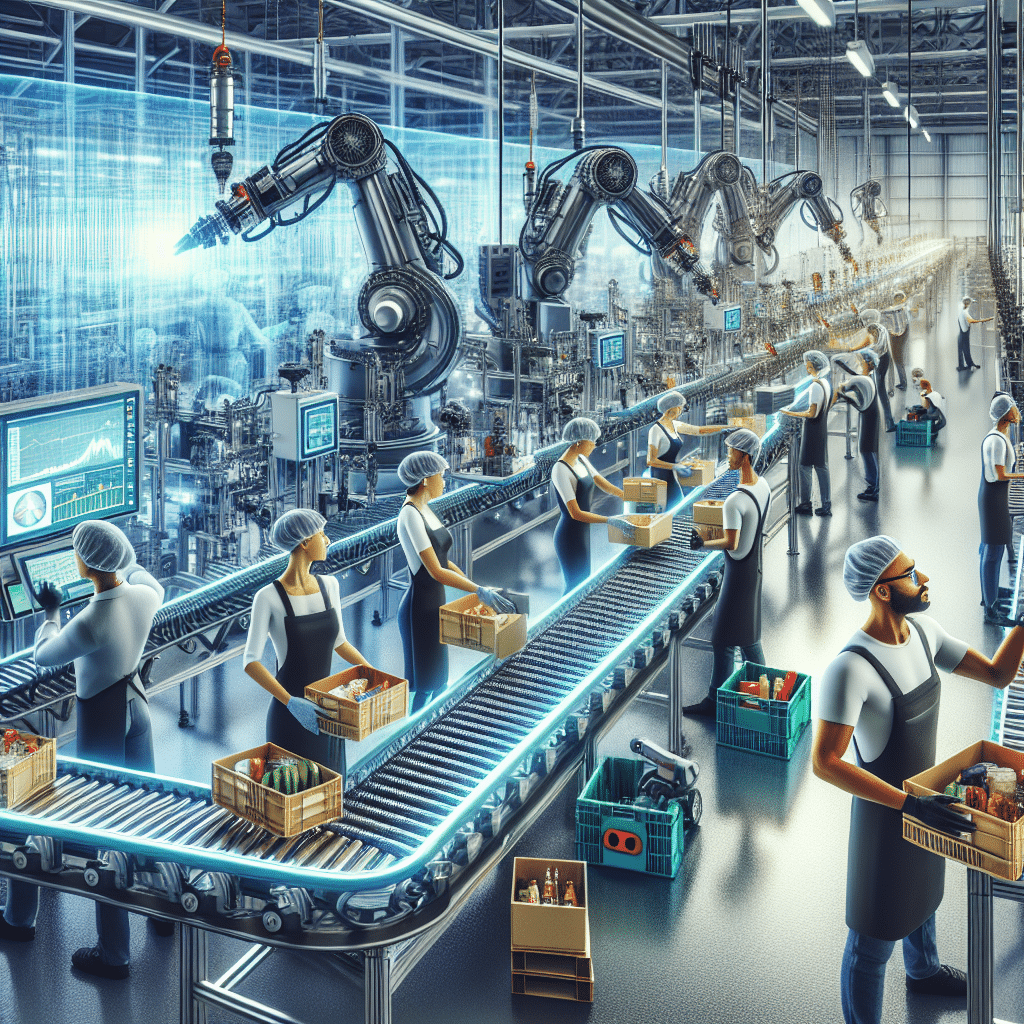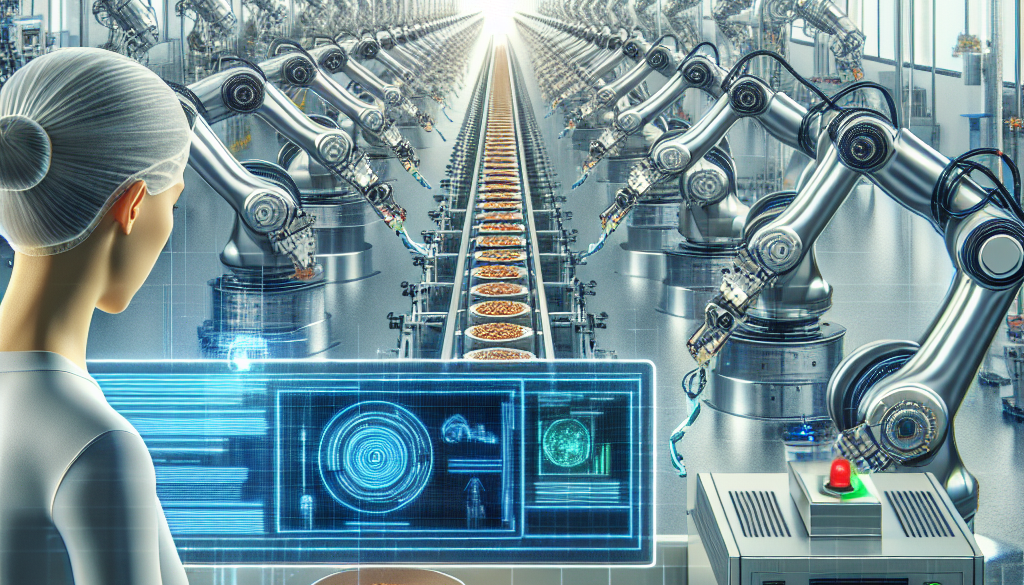Boosting Food Industry Efficiency With Automation
-
Table of Contents
- Automation Enhances Efficiency in the Food Industry
- The Rise of Automation in Food Processing and Packaging
- Statistical Insights into Automation’s Impact
- Benefits of Automation for Food Industry Efficiency
- Challenges and Considerations
- Case Studies: Success Stories of Automation in the Food Industry
- Conclusion: Embracing Automation for a Competitive Edge
- Boost Your Food Industry Operations with ETprotein’s Protein Products
Automation Enhances Efficiency in the Food Industry

The food industry is a dynamic and ever-evolving sector that plays a crucial role in the global economy. With the growing population and the increasing demand for food production, the industry is under constant pressure to enhance efficiency and productivity. Automation has emerged as a game-changer in this context, offering numerous benefits that can significantly boost the efficiency of food industry operations. This article delves into the ways automation is transforming the food industry, backed by statistics and insights that underscore its importance.
The Rise of Automation in Food Processing and Packaging
Automation in the food industry encompasses a wide range of technologies, from robotics and artificial intelligence (AI) to advanced machinery and control systems. These technologies are being employed at various stages of food production, including processing, packaging, and distribution.
- Processing: Automated systems in food processing can handle tasks such as sorting, cutting, and cooking with precision and speed, reducing the need for manual labor and minimizing human error.
- Packaging: Automated packaging lines can quickly and accurately package products, ensuring consistency and compliance with health standards. This not only speeds up the process but also extends the shelf life of food products.
- Distribution: Automation in distribution includes the use of conveyor belts, automated storage and retrieval systems (AS/RS), and autonomous vehicles, all of which streamline the movement of goods from production to the point of sale.
Statistical Insights into Automation’s Impact
According to a report by the Association for Packaging and Processing Technologies (PMMI), the food packaging machinery market is expected to reach $11.2 billion by 2025, with automation being a key driver of growth. Furthermore, a study by Meticulous Research predicts that the food automation industry will grow at a CAGR of 9.5% from 2020 to 2027, indicating the increasing adoption of automated solutions.
Benefits of Automation for Food Industry Efficiency
Automation offers a plethora of advantages that contribute to increased efficiency in the food industry. Here are some of the key benefits:
- Enhanced Productivity: Automated systems can operate continuously without fatigue, leading to higher output and consistent production rates.
- Improved Quality Control: Automation ensures uniform quality and helps in maintaining high standards, which is crucial for consumer satisfaction and brand reputation.
- Cost Savings: Although the initial investment in automation can be significant, the long-term savings on labor costs and reduced waste contribute to overall cost efficiency.
- Worker Safety: By taking over dangerous or repetitive tasks, automation reduces the risk of workplace injuries and improves working conditions.
- Agility and Scalability: Automated systems can be quickly adapted to changes in production volume or product types, allowing for greater flexibility in response to market demands.
Challenges and Considerations
While automation presents numerous opportunities, there are also challenges to consider:
- Initial Investment: The cost of implementing automated systems can be a barrier for some businesses, particularly small and medium-sized enterprises (SMEs).
- Technical Expertise: Operating and maintaining automated equipment requires skilled personnel, which may necessitate additional training or hiring.
- Integration with Existing Systems: Integrating new technologies with existing infrastructure can be complex and requires careful planning.
Case Studies: Success Stories of Automation in the Food Industry
Many companies have successfully integrated automation into their operations. For instance, a leading dairy company implemented robotic milking systems, resulting in a 20% increase in milk production. Similarly, a bakery chain introduced automated dough mixers and conveyors, which doubled their production capacity while maintaining consistent product quality.
Conclusion: Embracing Automation for a Competitive Edge
In conclusion, automation is a powerful tool for boosting efficiency in the food industry. By enhancing productivity, ensuring quality, and reducing costs, automated technologies are helping businesses meet the growing demands of the global market. While challenges exist, the benefits of automation are clear, and companies that invest in these technologies are likely to gain a competitive edge.
Boost Your Food Industry Operations with ETprotein’s Protein Products
As the food industry continues to evolve with automation, the demand for high-quality ingredients remains constant. ETprotein offers a range of protein products that can enhance the nutritional profile of your food products. Their organic bulk vegan proteins and L-(+)-Ergothioneine are perfect for businesses looking to innovate and improve their offerings in an automated food industry landscape.
About ETprotein:
ETprotein, a reputable protein and L-(+)-Ergothioneine (EGT) Chinese factory manufacturer and supplier, is renowned for producing, stocking, exporting, and delivering the highest quality organic bulk vegan proteins and L-(+)-Ergothioneine. They include Organic rice protein, clear rice protein, pea protein, clear pea protein, watermelon seed protein, pumpkin seed protein, sunflower seed protein, mung bean protein, peanut protein, and L-(+)-Ergothioneine EGT Pharmaceutical grade, L-(+)-Ergothioneine EGT food grade, L-(+)-Ergothioneine EGT cosmetic grade, L-(+)-Ergothioneine EGT reference grade and L-(+)-Ergothioneine EGT standard. Their offerings, characterized by a neutral taste, non-GMO, allergen-free attributes, with L-(+)-Ergothioneine purity over 98%, 99%, cater to a diverse range of industries. They serve nutraceutical, pharmaceutical, cosmeceutical, veterinary, as well as food and beverage finished product distributors, traders, and manufacturers across Europe, USA, Canada, Australia, Thailand, Japan, Korea, Brazil, and Chile, among others.
ETprotein specialization includes exporting and delivering tailor-made protein powder and finished nutritional supplements. Their extensive product range covers sectors like Food and Beverage, Sports Nutrition, Weight Management, Dietary Supplements, Health and Wellness Products, and Infant Formula, ensuring comprehensive solutions to meet all your protein needs.
As a trusted company by leading global food and beverage brands and Fortune 500 companies, ETprotein reinforces China’s reputation in the global arena. For more information or to sample their products, please contact them and email sales(at)ETprotein.com today.












